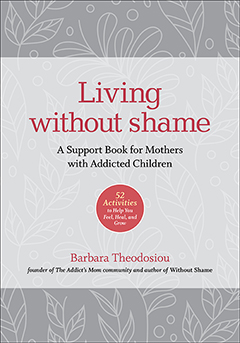
"When was the last time you apologized to yourself?"

Other titles you may like.
Visit Recovery Road to view and listen to all the episodes.
Episode 25 -- July 9, 2020
Sorry, Self: Being Gentle with Ourselves during a Pandemic
When our fight with addiction began, we all put on battle armor. We felt this armor was necessary to protect ourselves and our families from the new horrors we were facing, but then we never took it off. And that armor gets very heavy if we never take it off.
There are many life-changing lessons that I've learned from the sisterhood of other mothers of addicted children. But perhaps one of the most important things I've learned is that while there are times I needed to put on my armor to continue my fight against addiction, my life is more than addiction, and there are other times in my life when that armor may only weigh me down. Sharing without shame with other mothers who understand, or spending a few moments for myself when I try not to even think about addiction, can provide some much-needed rest.
The sisterhood of other mothers of addicted children has often had to remind me that I am more than this fight against addiction. My children's lives have been affected by the disease of addiction; my family members' lives have been affected by the disease of addiction; my life has been affected by the disease of addiction. But my life is more than this disease, and if I don't take off that battle armor from time to time, I lose touch with who I truly am and how my life has value.
Within this sisterhood, when we share without shame with each other, we don't need that armor, because no matter how different we are, we see and feel commonalities in our experiences. We have empathy and understanding for each other and what we're going through. We reveal our unprotected vulnerability with each other, and when we do, we often recognize something in each other: We have forgotten that we matter. So, we have to remind each other of our worth, our value. We matter. We were people before we had our children; we were people before our children's lives were touched by the disease of addiction. If we give addiction all the power in our lives, we're telling ourselves that we don't matter.
Author Linda Wooten once wrote, "Being a mother is learning about strengths you didn't know you had, and dealing with fears you didn't know existed." When we realize that our children are suffering under the weight of addiction, our worst fears become a reality. We have to deal with our fears head on, and we learn so much about ourselves as mothers, as women. But we often forget ourselves. I know I did; I still do.
It's been challenging detailing my family's journey through addiction. But I needed to do it to get back to me. By dropping my battle armor and sharing without shame, I've remembered that I matter. And I've remembered that before I can have truly healthy relationships with others, I have to have a relationship with myself. There came a time when the only relationship I was focusing on was the challenged and toxic relationship I had with addiction. I want you to remember that you matter.
This first exercise is called "Sorry, Self"
Shame is often accompanied by feelings of low self-worth. That is, sometimes we let the shame other people cast on us take our power because we're already not feeling very powerful, valuable, or worthy. Learning to be gentle with ourselves is a big step forward in feeling a sense of inner peace. Sometimes it feels like we're always apologizing to other people for things we've done or for who we are. When it comes to addiction's impact on our family, we often apologize to those around us for how our loved one's addiction has impacted them. But when was the last time you apologized to yourself?
On your print-out or in your journal, list five times when you were too hard on yourself, expected too much of yourself, thought too little of yourself, allowed someone to push you too far, or generally mistreated yourself. Then say, "Sorry, self!"
If you'd like to pause the podcast and do this now, go ahead. Or you can go back and do it later.
The second exercise for today is called "Quitting Is Okay"
It's really only when the levee breaks that we begin to realize we're overscheduled, overcommitted, and trying to be everything to everyone. When we experience a significant change in life--or many in a row--such as contending with the fact that addiction has affected our family, one of the reasons we begin to feel burnout is that we're neglecting to adjust to the new normal. Sometimes our circumstances would be calmer and more manageable if we scaled back on our commitments. That's right: Sometimes we need to quit things to which we've previously committed.
On your print-out or in your journal, make a list of all your current commitments. Are there a handful of items you could take a raincheck on, postpone, or hand over to other people? Try to identify at least three things that would simplify your weekly schedule.
Do this exercise and see where you can relieve some pressure in just a moment, after this podcast wraps up. You can find more exercises like this in Barbara Theodosiou's book, LIving Without Shame.
About the Author:
Barbara Theodosiou is a mother, activist, and the founder of The Addict's Mom, an online community where tens of thousands of mothers with addicted children can "Share Without Shame." Barbara has been widely recognized for her work as a family recovery advocate, including the receipt of a White House Champion of Change award in 2016.
© 2020 by Spotlight PR
All rights reserved




